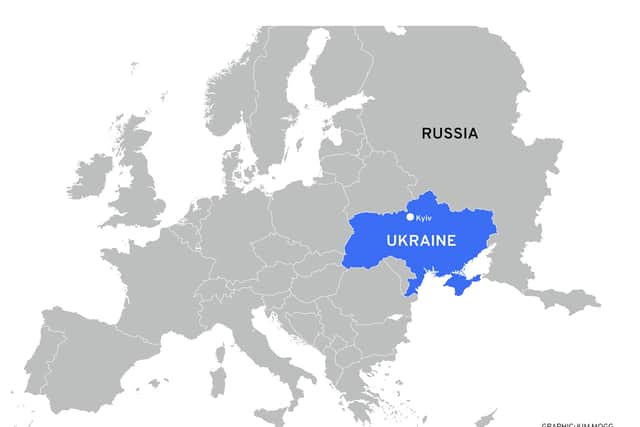Joe Biden ‘convinced’ Vladimir Putin has decided to invade Russia - but hopes for diplomatic solutions remain
This article contains affiliate links. We may earn a small commission on items purchased through this article, but that does not affect our editorial judgement.
and live on Freeview channel 276
US President Joe Biden has told a White House press briefing he is “convinced” his Russian counterpart Vladimir Putin has “made the decision” to move his military across the Ukrainian border, having spent weeks saying he thought the Russian leader was undecided.
Biden said claims by Russian separatists that Ukraine is planning to launch an offensive into the battle-torn Donbas region “defies basic logic”, given the country is currently surrounded by foreign troops.
Advertisement
Hide AdAdvertisement
Hide AdThe US leader also said suggestions made in the Russian state media that a genocide is taking place in the Donbas were “phoney”.
Only hours before his statement, the UK Foreign Office announced it had decided to “temporarily” move its diplomats out of Kyiv, relocating them to the west of the country.
The department said British embassy officials will relocate to Lviv, situated near the border with Poland.
What has the UK said?
Prime Minister Boris Johnson has called for western leaders to unite against Vladimir Putin and show the Russian leader he will pay a “high price” if he sends his troops into Ukraine.
Advertisement
Hide AdAdvertisement
Hide AdThe Prime Minister will head to the Munich Security Conference on Saturday (19 February) to make a plea for “unnecessary bloodshed” to be avoided by pursuing a diplomatic route to prevent a conflict in eastern Europe.
The Bavarian summit will take place against the backdrop of Putin continuing to parade Russia’s military might.
With estimates that 150,000 Russian troops are posted around Ukraine’s borders, Johnson has previously called the situation “very grim”.


The Russian defence ministry has announced it will be carrying out fresh exercises on Saturday (19 February) involving its strategic nuclear forces.
Advertisement
Hide AdAdvertisement
Hide AdPutin will observe the drills involving multiple practice launches of intercontinental ballistic missiles and cruise missiles in a demonstration that Russia remains a nuclear superpower.
But in comments made before embarking on his trip to Germany, the Prime Minister said “diplomacy can still prevail” if the West puts on a united front in terms of agreeing punishing sanctions to slap on Moscow.
“There is still a chance to avoid unnecessary bloodshed, but it will require an overwhelming display of western solidarity beyond anything we have seen in recent history,” he said.
“Allies need to speak with one voice to stress to President Putin the high price he will pay for any further Russian invasion of Ukraine. Diplomacy can still prevail.”
Advertisement
Hide AdAdvertisement
Hide AdWhat happens next?
There are concerns among western allies that the Kremlin could use “disinformation” and a possible “false flag” operation to justify an offensive, particularly with growing activity in separatist-held areas of Ukraine.
Putin has insisted that the large-scale military exercises with Belarusian forces close to the Ukrainian border are “purely defensive” and do not represent a threat to any other country.
Tensions in separatist areas have increased with reports of separate explosions in recent days.
Two explosions shook the rebel-controlled city of Luhansk early on Saturday (19 February), while another was reported to have occurred in the centre of the city of Donetsk on Friday.
Advertisement
Hide AdAdvertisement
Hide AdThe Luhansk Information Centre said one of the blasts was in a natural gas main and cited witnesses as saying the other was at a vehicle service station.
There was no immediate word on injuries or a cause, but Luhansk officials blamed a gas main explosion earlier in the week on sabotage.
The conflict between Ukrainian government forces and the separatists erupted in 2014 following the ousting of the pro-Moscow government in Kyiv and has killed more than 14,000 people.
A message from the editor:
Thank you for reading. NationalWorld is a new national news brand, produced by a team of journalists, editors, video producers and designers who live and work across the UK. Find out more about who’s who in the team, and our editorial values. We want to start a community among our readers, so please follow us on Facebook, Twitter and Instagram, and keep the conversation going. You can also sign up to our newsletters and get a curated selection of our best reads to your inbox every day.
Comment Guidelines
National World encourages reader discussion on our stories. User feedback, insights and back-and-forth exchanges add a rich layer of context to reporting. Please review our Community Guidelines before commenting.
